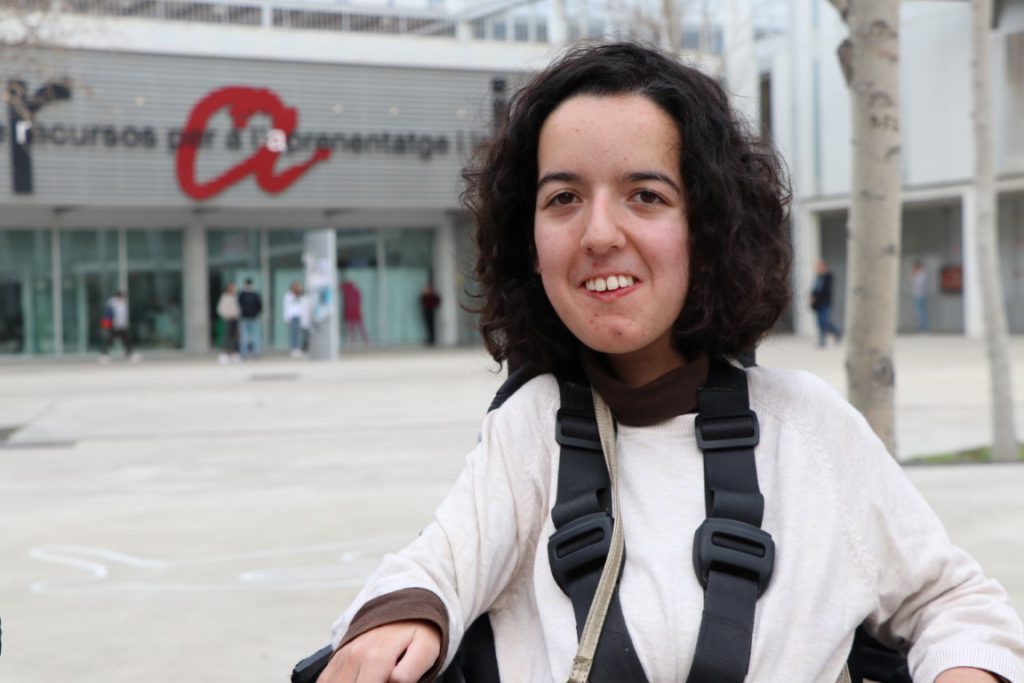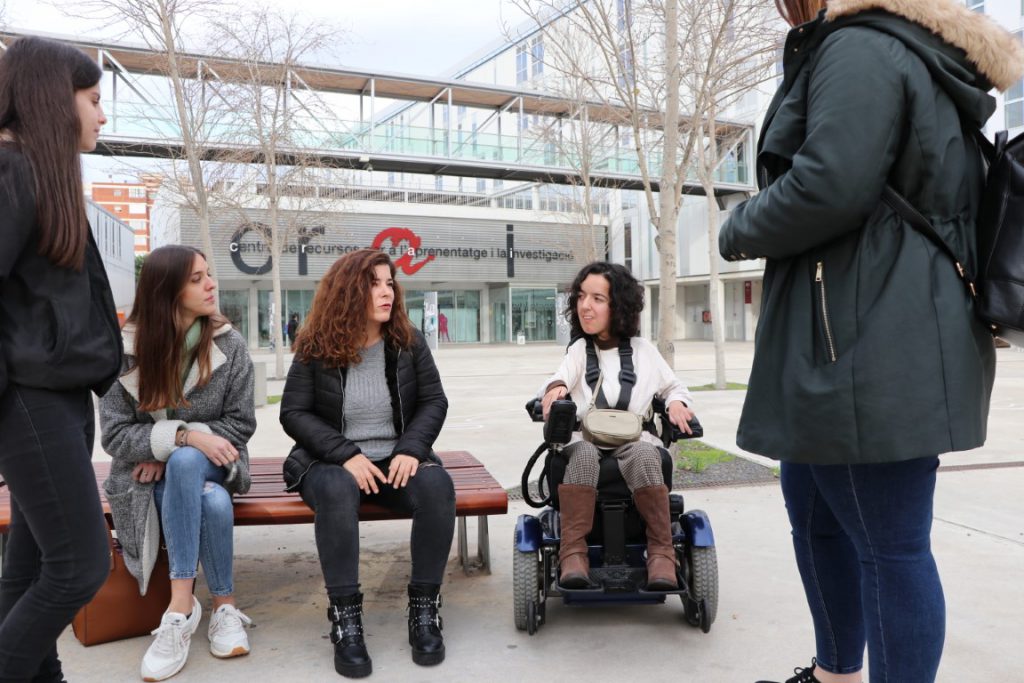11/02/2020
Alba Buendía, student on the URV’s Bachelor’s Degree in English
“Going on an Erasmus visit is one way of making my life like those of other people”

Alba Buendía is a student on the URV’s Bachelor’s Degree in English and has spinal muscular atrophy, a disease that leads to the loss of muscle mass. For this reason she has started a crowd funding campaign so that she can get the assistance she needs in order to complete her studies at York Saint John University (United Kingdom) Alba Buendía, student on the Bachelor’s Degree in English
Alba Buendía, third-year student on the Bachelor’s Degree in English at the URV, has just started a crowdfundind campaign so she can complete her studies at York Saint John University (United Kingdom) through an Erasmus visit next year. This is because living independently is more difficult for people who have spinal muscular atrophy (SMA), which she was diagnosed with when she was 8 months old and which has caused the progressive loss of muscular strength because the motor neurones in her spinal cord cannot transmit signals to the muscles. It is for this reason that her parents and the people who help Alba (such as the person who helps her to take notes and do exams at the University) are constantly moving her hands and legs.
What made you decide to take a Bachelor’s Degree in English?
On one hand, I have a desire to communicate, communication being the principal tool that I use to help me develop in the world, and on the other, English will open doors for me to explore other countries and cultures and meet more people. It is highly satisfying because I enjoy what I am doing very much.
What do you think you will get out of the Erasmus visit?
A theoretical knowledge of a language is all well and good, but you have to put it into practice, and the best way, if you are studying English, is to do this in an English speaking country. You also get to learn about other ways of life, so it is beneficial on both an academic and a personal level.
To study abroad, you say you need almost €30,000 which are not covered by the Erasmus grant. Why do you need this money?
It is a very high figure because I have certain needs that my classmates do not have: I need somebody with me 24 hours a day every day of the week to help me do everything. I also need accommodation and transport that I can access. This is all in addition to the personal expenses that every student has.
To what extent is personal assistance important?
I have a level of disability of 88%, which means that I cannot move on my own and I have no personal autonomy. In class, my assistant has to take my notes for me and must write out my answers during tests and exams. I also need someone with me when I move around because if I drop the control lever for my wheelchair, I cannot get it back. And I will have all of these needs when I study in another country.
You were one of the protagonists during the latest fund-raising Marathon on TV3. Did you expect the repercussions that it has had?
No, since then many people stop me in the street. I think that people know about the existence of minority diseases, but they are not aware of what they mean for the lives of the people who have them. This is why it is very important to help people to see what our day-to-day existence is like, which is what I did during the Marathon, because not only do we have to normalise these diseases, we also have to show that we can develop despite the disease. And people are still not used to that and find it difficult to accept.
What needs to happen for society to become fully inclusive?
People need to take an interest in other people who seem different and to get over their fear of difference. I have seen this in my classmates at University and in people close to me: once they get to know you, there’s a kind of change, they evolve as people and any differences seem to disappear.
If you don’t go out, society cannot see you, which means that you don’t exist
How can this be achieved?
It is not always other people’s fault, those of us who have different physical or mental conditions must also accept some of the responsibility; because we have been discriminated against, we have shut ourselves off in our comfort zones. But if you don’t go out, society cannot see you, which means that you don’t exist. If we want the situation to change, we must try to lead lives that are as normal as possible and make ourselves more visible by going outside, regardless of the obstacles.
Is doing an Erasmus visit an example of this?
If you have a right, you have to struggle to achieve it. If that is the case, why not fight to get as many opportunities as the people around you? I want to make my life the same as other people’s, and an Erasmus visit is one way of doing this. It is difficult but it can be done.
Another goal was to study at the University. What has this meant for you?
It has been a chance to get to know people and to expose myself to new ideas. My classmates and my friends have given me lots of support both academically and emotionally, as have my teachers in the Department of English and German Studies.

How can the URV improve for people with disability?
I have been participating in a project to improve accessibility to learning and knowledge technologies at the University. But it would be good if we as disabled people were able to participate in the Plan for Assisting People with Disabilities so that we could propose improvements and help manage accessibility because it is we who best understand the barriers that we face every day.
What would you like to do on a professional level when you have completed your degree?
Although it’s a little early to be thinking about it, I would like to combine translation in the audiovisual world with teaching because I feel very comfortable right where I am at the moment. The URV and the teachers at the Department of English and German Studies have been really welcoming and supportive, so it would be an honour to be able to work with them.
You can find the website for Alba Buendía’s crowdfunding camp here.
